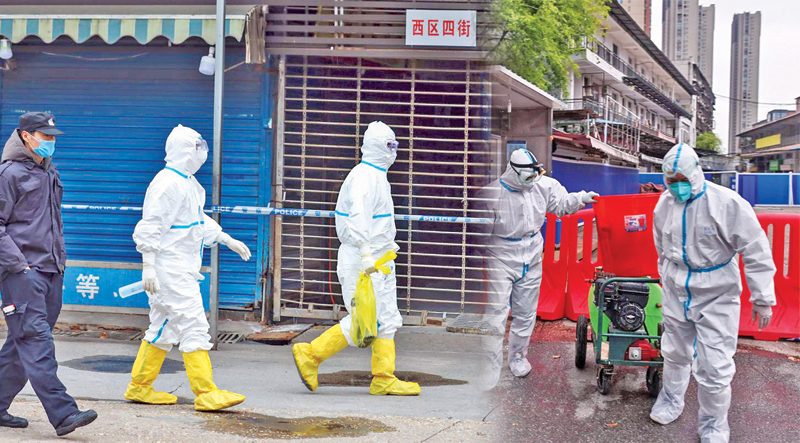A World Health Organization (WHO) team tracing the origins of COVID-19 on Sunday visited a food market in Wuhan, where the virus was initially detected.
The 10-strong international team walked through sections of the Baishazhou seafood center — one of the largest wet markets in Wuhan — surrounded by a large entourage of Chinese officials and representatives.
Public access to the market has been restricted since the authorities closed it at the beginning of last year.
On December 31, 2019, four cases of a mystery pneumonia were reported in the market, which was later identified as the novel coronavirus. By the end of January, Wuhan had gone into a 76-day lockdown to contain the COVID-19 spread.
International health experts believe the market still plays a role in tracing the origins of the virus. A single visit by scientists, however, is unlikely to confirm the virus’ origins.
On Saturday, WHO experts continued their probe into the origin of the COVID-19 pandemic on the second full working day with a visit to the Wuhan Jinyintan Hospital.
The experts arrived in China on January 14, but spent two weeks in mandatory quarantine. During this time they communicated with Chinese officials by video calls to lay the groundwork for field visits.
The team will also visit the Wuhan Institute of Virology, and laboratories at medical facilities, including the Wuhan Center for Disease Control.
China seeks to avoid blame for alleged missteps and cover-ups in its early response to the coronavirus outbreak and has pushed the idea that the virus existed abroad before it was discovered in Wuhan.
Meanwhile, Bolivia has reached a deal to receive around 1 million vaccine doses in February via the COVAX program. Earlier this week, the country received 20,000 doses of Russia’s Sputnik V vaccine.
“In February we will receive almost a million vaccines. We are making progress, we have vaccines, we have hope, we will move forward,” said President Luis Arce.
The COVAX program, backed by the WHO and Gavi vaccine alliance, wants to deliver 1.3 billion doses of approved vaccines — from suppliers, including Pfizer and AstraZeneca — to 92 eligible low- and middle-income nations this year.
Algeria has launched its coronavirus vaccination campaign after receiving a first shipment of the Russian Sputnik V vaccine. The drive began in the northern city of Blida, which was the epicenter of the country’s virus outbreak. While the country has ordered 500,000 doses from Moscow, it is also expecting a shipment of the AstraZeneca vaccine on Sunday. In a bid to immunize all of Algeria’s 44 million people, doses of vaccines have also been procured from India and China.
Tunisia has become the third African country to register Russia’s Sputnik V vaccine, according to the Russian Direct Investment Fund. Worldwide, it joins Russia, Belarus, Algeria, Argentina, Bolivia, Serbia, Palestine, Venezuela, Paraguay, Turkmenistan, Hungary, the UAE, Iran and the Republic of Guinea in registering Moscow’s coronavirus shot.
The Pakistani government says it will receive 17 million doses of the AstraZeneca vaccine under the WHO’s COVAX Facility, out of which up to 7 million would arrive by March.
Planning Minister Asad Umar tweeted Saturday that a plane has also been sent to China to bring the first tranche of half a million doses of China’s Sinopharm’s vaccine, enough to inoculate 250,000 out of 400,000 health workers.
Dr. Faisal Sultan, Prime Minister Imran Khan’s special aide on health, said the vaccination drive will start next week.
Pakistan has so far confirmed 544,813 COVID cases and 11,657 related deaths.
Italy’s medicines agency AIFA has approved the AstraZeneca vaccine for all adults but recommended alternatives should be given to people over the age of 55.
For the best use of the vaccine, the agency recommended: “preferential use of the AstraZeneca vaccine, pending further data, in subjects between 18 and 55 years old, for whom more solid evidence is available.”
Despite the European Union approving the shot, the agency noted “a level of uncertainty” about the vaccine’s effectiveness in people over the age of 55, as the age group was “poorly represented” in trials.
The Italian agency’s decision comes after Germany’s vaccine commission said Thursday it could not recommend the use of AstraZeneca’s coronavirus vaccine for persons aged 65 years and older. (DW)


